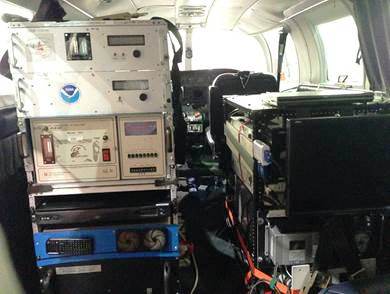September, 2014
Beginning September 15 and running through late October, Dr. Xinrong Ren, an atmospheric scientist with the Cooperative Institute for Climate and Satellites-Maryland located at NOAA’s Air Resources Laboratory (ARL), will participate in an aircraft study to investigate the emissions of methane and associated air pollutants from natural gas operations (primarily hydraulic fracturing or fracking) in Southwestern Pennsylvania. The study will be conducted in collaboration with Dr. Russell Dickerson, Principle Investigator, from the University of Maryland’s Department of Atmospheric and Oceanic Science. Instruments measuring methane, carbon dioxide, and other air pollutants will be installed on a Cessna 402 airplane that is owned by the University Research Foundation. Measurements will be collected both upwind and downwind of the natural gas operations. Based on the mass balance method, the emissions will be estimated using the in-situ observations combined with meteorological conditions. Dr. Ren is responsible for flight planning, aircraft data collection, and post-flight data processing and analysis. ARL has contributed gas analyzers and some aircraft technical support for the study.

ARL gas analyzers on board a Cessna 402B aircraft that will be used for the study. Photo Credit: NOAA/ARL
Background: Air emissions from fracking operations are related to methane leaks originating from wells and from natural gas powered equipment such as compressors, drilling rigs, and pumps. Emissions generated can impact local air quality as well as travel downwind and impact other areas. In the past few years massive fracking operations have been conducted in the eastern US, including in West Virginia and Pennsylvania. How much methane emissions and other air pollutants are released into the air and where they go is uncertain. The Maryland Department of Environment, primary funder for the study, is interested in knowing the impacts on Maryland’s climate and air quality from the fracking operations in upwind states. This study is designed to improve understanding of the emissions of methane and other air pollutants from the fracking operations in the region and will help to evaluate impacts on Maryland.
Significance: Methane, the principle component of natural gas, is the second most prevalent greenhouse gas emitted by human activities after carbon dioxide (CO2). Yet, methane’s global warming potential is 20 times that of CO2. Fracking has raised lots of environmental concerns, including risks to air quality. Fracking operations have expanded rapidly across the country, and a growing body of research suggests that methane emissions are grossly underestimated from these operations. Quantifying emissions of methane and associated air pollutants from fracking has become increasingly more important to air quality managers and regulators.

